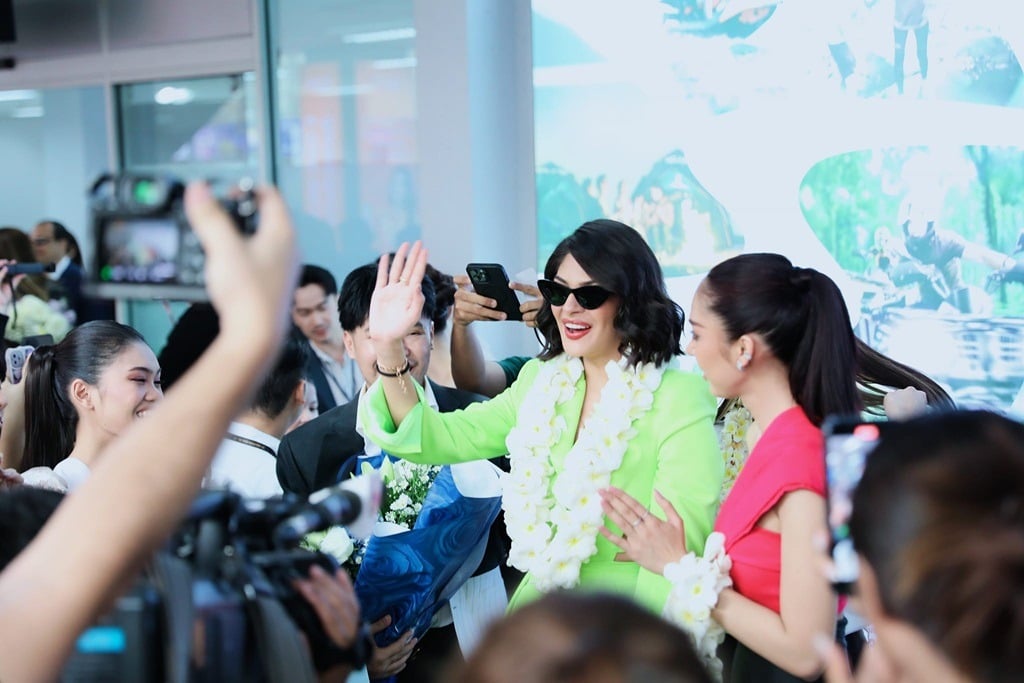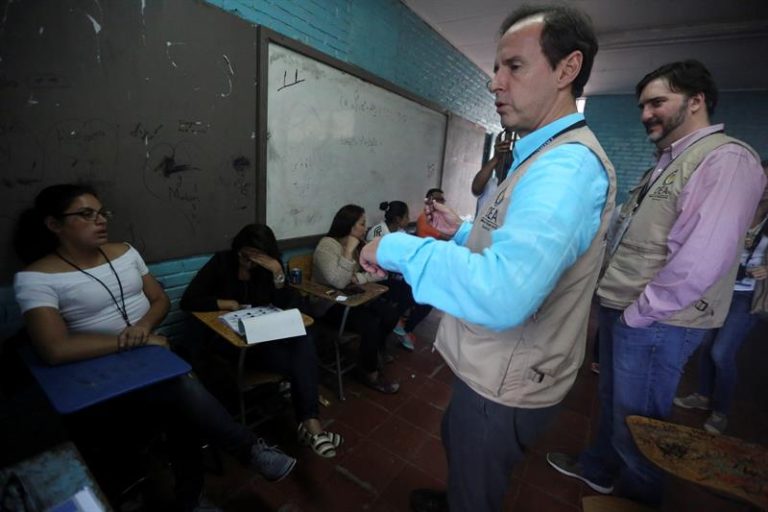15 de marzo 2021

News About Sheynnis Palacios Not Covered by Media Operating in Nicaragua

PUBLICIDAD 1M
PUBLICIDAD 4D
PUBLICIDAD 5D
Observers should be invited six months before the election. Ipade has been confiscated and EyT limited by “foreign agents” law

Time is running out during a key election year in which voters will define Nicaragua’s course, between dictatorship or democratic change. However, the Ortega regime shows no interest in opening a process of electoral reforms, which should guarantee that the elections of November 7, 2021 have legitimacy and transparency. Eight months before the elections, the Electoral Power has not made a formal announcement, which is normally made a year in advance, and neither does it show signs of openness to guarantee national and international electoral observation.
At the end of last week, representatives of the General Secretariat of the Organization of American States (OAS) affirmed that they have not seen "advances" in terms of reforms to a group of national experts, with only two months left before the ultimatum given by the OAS General Assembly to Daniel Ortega's regime.
"I would have liked to say that we learned something new or relevant, but in reality it was just a general conversation to reiterate our willingness to collaborate with the OAS and that we will continue to push for reforms," a source who was present at the meeting told CONFIDENCIAL.
Electoral observation is key to give confidence to the Nicaraguan voter. It is well remembered that the historic 1990 elections, which permitted the exit of the first Sandinista dictatorship, were labeled as the "most observed elections in history".
Members of the campaign team of the then National Opposition Union (UNO), were consulted for a CONFIDENCIAL special report published on February 25, and commented that in that year, the fear of voting among the population due to reprisals and repression by Sandinismo, was overcome when citizens and opposition leaders became aware of the accompaniment by international observers from the United Nations and the Organization of American States (OAS).
"Since the first demonstrations in September, we realized that we were accompanied by UNOVEN - United Nations Mission of Observers to Verify the Elections in Nicaragua - and the OAS; then came the Carter Center", explained one of the members of the campaign team.
José Antonio Peraza, member of the Group for Electoral Reforms (GPRE), emphasizes that unrestricted electoral observation is, together with the presence of political party monitors in the Voting Boards, the two most important elements to guarantee transparency in the voting. The GPRE is integrated by jurists, political scientists, lawyers and specialists who prepared a document on the necessary reforms for the 2021 process.
"Electoral observation is fundamental. From my point of view, it is the number one condition for there to be conditions for free elections. Without that condition of the presence of national and international observers, it is very difficult to go into an electoral process," he noted.
However, in November 2020, CONFIDENCIAL revealed that Ortega ordered cosmetic reforms to make up for the 2021 electoral process. And regarding the opening to electoral observation, he limited himself to saying: "that will be decided at another time".
The point is, time goes by and that moment does not come. In the case of international organizations, they need to be formally invited at least six months before the elections, in order to be able to observe the development of the whole electoral process as such, not only during the peak campaign times of the political parties. In addition, the invitation has to be made through the Foreign Ministry.
"By May or June the observation organizations must be on their way. If after June they have not arrived, we are in trouble", warns Peraza. The specialist adds that "normally they (the observers) need three or four months to prepare all their structure to supervise the electoral process, because fraud is not committed on the same day of the elections. It is planned months in advance. The observers have to review the computation system, how the prosecutors are going to be mobilized to be in the Voting Reception Board, the transformations in the Supreme Electoral Council".
Peraza assures that the European Union would have made it clear to the regime that they are willing to participate in an electoral observation process, as long as the formal invitation is made no later than May. In case this does not happen, the EU would not send any observer team.
CONFIDENCIAL consulted the press office of the European Union in the country, but there was no response from the entity.
Rosa Marina Zelaya, former president of the Supreme Electoral Council of Nicaragua, indicates that the invitation to international observation organizations has to be made parallel to the call of the Electoral Power for the elections.
"When the call for elections is made, the most reasonable thing is that almost immediately, the Supreme Electoral Council, through the Chancellery, invites the observers. Those who normally arrive to observe the election process with qualified technicians and are very well known are the Carter Center, the Organization of American States, the European Union, the United Nations, the National Democratic Institute and the Republican Institute. An agreement of understanding is established and signed by the parties to determine the working mechanisms of the observers,” explains Zelaya.
The Supreme Electoral Council has still not released the calendar for the 2021 elections. Administered by magistrates loyal to the dictatorship, the Electoral Power faces a serious problem of null credibility due to the electoral fraud that has been carried out since the municipal elections of 2008 to perpetuate Ortega’s regime in the spheres of power.
Zelaya also highlights the role of observers in giving confidence to voters to exercise their suffrage. "It is fundamental in elections that want to be seen as transparent and honest. The observer is an assistant outside the Electoral Power, outside the political parties, who in a more objective and serene way can give their views on the development of an electoral process, and this gives confidence to everyone. The Supreme Electoral Council itself, if it wants to do things well, can see it as an ally", he indicates.
Zelaya recalls that in the electoral processes in which she was involved as part of the Electoral Power, the observation groups were even given the opportunity to develop a parallel vote count.
"I remember that the United Nations and the OAS organized a parallel vote count. When the data provided by the Supreme Council and the data they had from their parallel count were compared, they were practically the same results, and that is a confirmation that the process was carried out normally", she adds.
National electoral observation organizations have been hit by the repression of the dictatorship. The Institute for Democracy (Ipade) was stripped of its legal status in December 2018 and in February of this year, the illegal confiscation of its offices and properties was consummated.
The organization Ethics and Transparency (EyT), issued a statement in which it informed that its operations would be financed only by contributions from national donors, in order to save itself from the spying and control of the dictatorship through the Law of Regulation of Foreign Agents.
"National observers have to recover the rights they had before the dictatorship took control of the Electoral Power. The observers had the right to enter the Voting Reception Board, to be present at the moment of the counting of the ballots, in the transmission of the data, in the handling of the electoral package, even in the transmission of the scrutiny report. If we can have two or even three national observers in each Voting Reception Board, that would be the best", Peraza estimates.
The last CID-Gallup survey, released at the beginning of February, showed that 65% of those consulted consider that it is "very probable" or "somewhat probable" that they will vote next November 7; however, they point out that one motivation will be that there will be "free elections".
"There is distrust in the whole electoral process and in the Council", Luis Haug, polling firm manager, said to CONFIDENCIAL at that time. "Here, it is also important to differentiate between two groups of the population: the sympathizers of Sandinismo who have more confidence in the Council and in the different results they can provide, and therefore tend to perceive that the presence of international observers is necessary in smaller percentages,", he added.
On the other hand," he continued, "those who have no party preference distrust the Ortega Administration; they are very suspicious of the results that could be obtained by the Council, and therefore request the presence of international observers in higher percentages ", he added.
Peraza insisted precisely on the imperious need for the regime to give legitimacy to the electoral process by means of observation, which in turn will translate into voter confidence.
"It is rule number one in the world. For there to be massive participation in voting, for people to participate, you need to have confidence in the electoral body and for there to be confidence in the electoral body, there has to be observation. It is fundamental. At the end of the day," he said, "national observation is always more important, but international observation gives strength, security, confidence and legitimacy to the electoral process".
This article been translated by Ana María Sampson, a Communication Science student at the University of Amsterdam and member of our staff*
Archivado como:
PUBLICIDAD 3M
PUBLICIDAD 3D